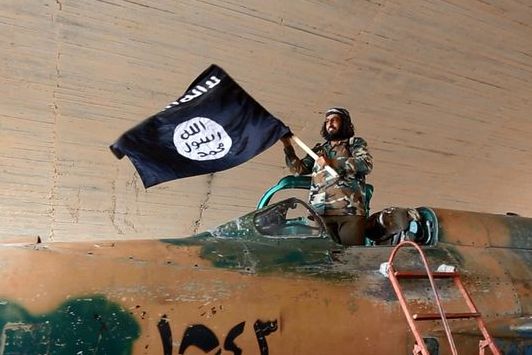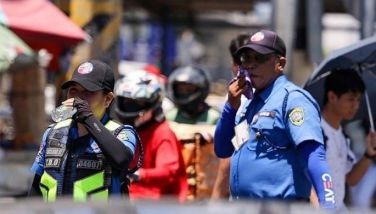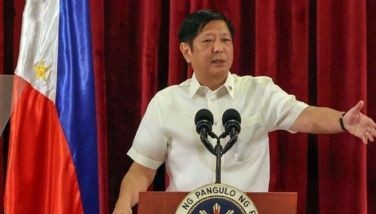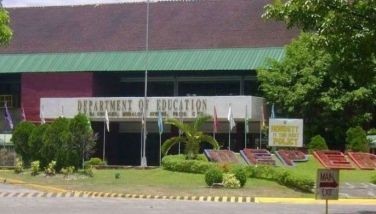100 foreign jihadists in Philippines? Government checking

Sources said the jihadists, who arrived in several batches, went straight to Mindanao from Indonesia in a bid to reinforce their trapped cohorts in Marawi. Uncredited AP, File
MANILA, Philippines — At least 100 foreign jihadists, fresh from their Islamic State (IS)-supervised military training in Indonesia, reportedly entered the country before the five-month Marawi siege was officially over.
Sources said the jihadists, who arrived in several batches, went straight to Mindanao from Indonesia in a bid to reinforce their trapped cohorts in Marawi.
“While a handful of these foreign militants made it to Marawi, most did not because of the tight security the military enforced around the city,” the source said.
Since the fighting started on May 23 until Marawi was liberated on Oct. 23, the military accounted for more than 900 bodies of terrorists, at least 20 of them foreign-looking.
The presence of these foreign jihadists, the source said, could be the reason why President Duterte kept on saying that the terrorism problem in the country is not over yet despite the defeat of the Maute group.
“This is now causing us some concerns because of the upcoming Christmas,” he said.
Meanwhile, a senior anti-terror official declined to confirm the presence of this huge number of foreign jihadists in the country.
“We are still validating this,” the official said, although he confirmed that prior to the Marawi siege, a dozen foreign militants – some from the Middle East – entered the country through Palawan and Tawi-Tawi from Malaysia.
He said government agents are verifying the presence of foreign jihadists in Mindanao as well as in other urban centers including Metro Manila.
There were also reports that all these foreign jihadists – including those who linked up with the Abu Sayyaf bandit group in Sulu, Baslian and Tawi-Tawi – are headed by a young Indonesian terrorist, identified as Abu Mohammad Busrow.
A separate intelligence brief showed that Busrow, along with a Jordanian terrorist, has a $1-million bounty on his head and is closely associated with slain Abu Sayyaf leader Isnilon Hapilon, who was said to be the designated IS emir in Southeast Asia.
Philippine National Police chief Director General Ronaldo dela Rosa earlier said that Malaysian terrorist Amin Baku assumed as head of the foreign and local terrorists in Marawi following the death of Hapilon and Omarkhayam Maute at the hands of government forces.
The Armed Forces of the Philippines (AFP) expressed belief that Baku was killed in the fighting in Marawi and the foreign and local militants in Mindanao have no leader.
While the AFP is maintaining this claim, it has mounted sustained anti-terror operations directed toward another IS sympathizer group, the Bangsamoro Islamic Freedom Fighters, in Maguindanao and North Cotabato.
Lessons from Marawi battle
Meawnhile, former AFP chief retired general Eduardo Año has shared lessons learned from the five-month Marawi siege to prepare members of the peace and order council against the threats of terrorism.
Año, now interior and local government undersecretary, said during the quarterly Regional Peace and Order Council (RPOC) meeting that one of the many lessons the government learned from the siege was poor governance.
“Poor governance contributes to the development of the would-be terrorists,” Año told the RPOC Western Mindanao chaired by Mayor Maria Isabelle Climaco-Salazar on Friday.
Año said other lessons were the urban warfare push, intelligence surveillance and reconnaissance, and signal intelligence.
The Royal Australian Air Force (RAAF) and the US military provided their Filipino counterparts with surveillance capabilities during the height of the Marawi battle.
But Año said the current laws in the country must also adapt to the developing threats of terrorism.
He said local government laws are not adequate to help authorities address the threat of extremism.
He said the social, political and economic conditioning makes communities vulnerable to terror narratives.
During the siege, President Duterte declared martial law in Mindanao and extended it until Dec. 31 to help the military quell groups sympathetic to the IS.
Meanwhile, troopers from the 4th and 5th Scout Ranger Battalions were undergoing stress debriefing following the five-month stint in Marawi fighting the Maute terrorists as well as the Abu Sayyaf bandit group.
The debriefing was being conducted by psychologists from the Western Mindanao Command (Westmincom) and Mayor Salazar, who is a guidance counselor by profession.
Salazar said the activity seeks to ensure psychological health, morale and welfare of the troops who liberated Marawi from lawless elements. – With Roel Pareño
- Latest
- Trending
































